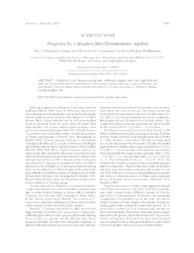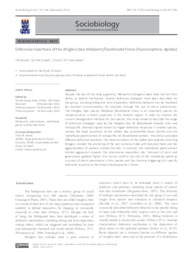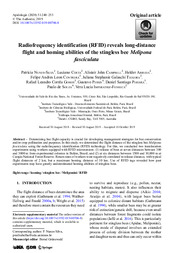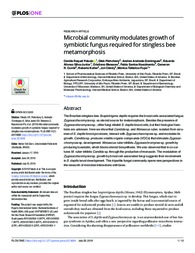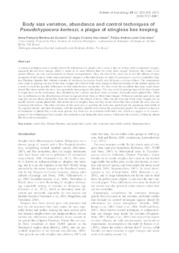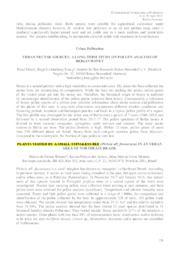Busca de Publicações
Filtrar por:
| Autoria: PERUQUETTI, R. C.; COSTA, L. da S. M. da; SILVA, V. S. da; DRUMOND, P. M. Frugivory is not frequent among bees. Although stingless bees visit aged fruits for pulp, the use of fresh fruits is recorded only for Trigona hypogea Silvestri, a species that does not visit flowers.... ... |
| Autoria: SILVA, J. B. da; LEÃO, K. de S.; TEIXEIRA, J. C. da S.; MENEZES, C.; COSTA, C. A.
|
| Autoria: NUNES, T. M.; ZUBEN, L. G. von; COSTA, L.; VENTURIERI, G. C. Despite the fact that Meliponini bee lost their sting apparatus (stingless bees), they did not lose their ability to defend themselves. A variety of defensive strategies is described for the group, su... ... |
| Autoria: NUNES-SILVA, P.; COSTA, L.; CAMPBELL, A. J.; ARRUDA, H.; CONTRERA, F. A. L.; TEIXEIRA, J. S. G.; GOMES, R. L. C.; PESSIN, G.; PEREIRA, D. S.; SOUZA, P. de; IMPERATRIZ-FONSECA, V. L. Determining bee flight capacity is crucial for developing management strategies for bee conservation and/or crop pollination and purposes. In this study, we determined the flight distance of the sting... ... |
| Autoria: PALUDO, C. R.; PISHCHANY, G.; DOMINGUEZ, A.-A.; SILVA JÚNIOR, E. A.; MENEZES, C.; NASCIMENTO, F. S.; CURRIE, C. R.; KOLTER, R.; CLARDY, J.; PUPO, M. T. Abstract: The Brazilian stingless bee Scaptotrigona depilis requires the brood cells-associated fungus Zygosaccharomyces sp. as steroid source for metamorphosis. Besides the presence of Zygosaccharomy... ... |
| Autoria: OLIVEIRA, A. P. M. de; VENTURIERI, G. C.; CONTRERA, F. A. L. A common technique used to control phorid fly infestations on stingless bee?s nests is the use of traps with commercial vinegars, especially the red wine vinegar, which is stated to be more efficient... ... |
| Autoria: RIBEIRO, M. de F.; SANTOS, K. P.; MARIANO, A. M. C. Plebeia aff. flavocincta is a small stingless bee known as ?mosquito? in Northeast Brazil. According to previous surveys, it occurs in rural areas (being abundant in the past, but quite scarce nowaday... ... |
| Autoria: TEIXEIRA, J. C. da S.; LEÃO, K. S.; QUEIROZ, A. C. M.; SANTOS, I. R. I.; CORDEIRO, H. K. C.; LAGE-FILHO, N. M.; VENTURIERI, G. C.; MENEZES, C.
|
| |
| Autoria: MENEZES, C.; VOLLET NETO, A.; CONTRERA, F. A. L.; VENTURIERI, G. C.; IMPERATRIZ-FONSECA, V. L.
|
Observações
1 - Por padrão são exibidas publicações dos últimos 20 anos. Para encontrar publicações mais antigas, configure o filtro ano de publicação, colocando o ano a partir do qual você deseja encontrar publicações. O filtro está na coluna da esquerda na busca acima.
2 - Para ler algumas publicações da Embrapa (apenas as que estão em formato ePub), é necessário ter, no celular ou computador, um desses softwares gratuitos. Sistemas Android: Google Play Livros; IOS: iBooks; Windows e Linux: software Calibre.
Acesse outras publicações
Acesse a Base de Dados da Pesquisa Agropecuária (BDPA) para consultar o acervo completo das bibliotecas da Embrapa.

